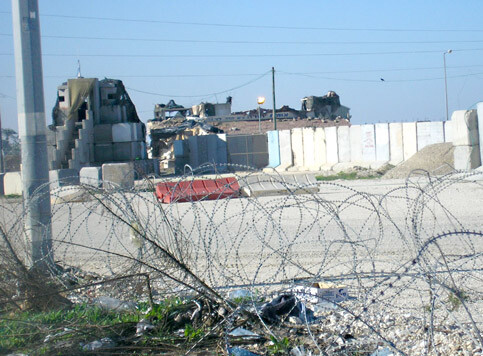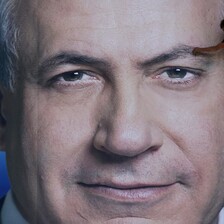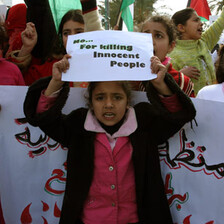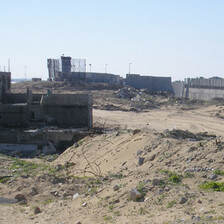
On the road south from Gaza City Israeli occupation forces are building a massive checkpoint complex. (Arjan El Fassed)
We are preparing now for lock down. I have this sense that perhaps a prison guard has in an American high security prison. I’ve seen it in the movies. The prisoners are causing too much trouble and you hear the heavy black boots of the guards stomp down the iron corridors. Then one of them shouts “lock down!” or some other phrase that hides the brutality of what is about to happen. Someone else pulls a huge switch and the sound of metal clanking metal is awesome.
That’s the preparation now. The Israeli Occupation Forces (IOF) are building everywhere. I thought they were mean to be disengaging? This, the Palestinians say, is their style: they build right up until the last minute — and you never know when that last minute is going to be.
On the road south from Gaza City they are building a massive checkpoint complex. It is just beside the Israeli Netzarim colony block. Just miles later the main checkpoint in Gaza (controlled only by traffic lights and distant military watchtowers, surrounded by once fertile land) comes up. The checkpoint is called Abu Houli (father of Houli) after the family who used to own the land. Local wits in Gaza have started to call the new IOF checkpoint complex Um Houli (mother of Houli). As always the Gazans take things in their stride.
The checkpoints in Gaza are nothing like those in the West Bank. They are dotted along the borders of Gaza and Israel and then planted firmly on the only north-south artery of the Strip. They are colossal — they span a couple of square kilometres and are managed not by people but electronically. The electronic gates are controlled by distant soldiers in watchtowers protecting roads that only settlers may use.
The passage of Palestinians relies on the whim of the soldiers in the towers, at least as far as anyone in Gaza can see. Red means “stop” and green means “go”. Sometimes they speak with loudspeakers, instructing private cars not to pass (until two weeks ago only yellow taxis were allowed to actually move from north to south in Gaza). Private cars are now able to move again: this peace process is truly magnificent.
So if the IOF are building more checkpoints, that sends out signals about disengagement — at least, about what will happen during the process of disengagement. The Israeli authorities have made a number of different announcements about what their plan is. Clearly the real plan is known only by a handful in the military-political establishment. However, the most published version of planned events indicates that towards the end of July they will begin to disengage from certain northern and southern settlements.
However, the specifics of such a plan are almost too obviously false. The settlements they promise to leave control certain key roads and would prevent them from cutting the Gaza Strip into three or possibly four parts, as they inevitably will.
Then there is the timing. People on Gaza’s dusty streets cannot imagine that the IOF want to announce to Palestinian militants and, more importantly, to militant Jewish settlers the exact date of disengagement. We all expect them to go early, probably as early as the middle of May. We all expect them to do it in less than a month. No time for chitchat or cups of coffee with the thousands of soldiers (three battalions and the Israeli border police) who will form three concentric rings around the Gaza Strip to move in on the rowdy settlers. If they go early they’ll be gone before the elections for the Palestinian Legislative Council in July — you heard it here first, folks.
So we sit and wait. Trying to stock up on canned food and some of the tasty food privileges we have (which might slip away when the IOF close all the borders in and out of Gaza). Sick people, university students — whoever needs to leave — they are clamouring to get out through the Rafah crossing now, before the IOF close it once again.
And once again we have lock down.
Eóin Murray is an Irish Human Rights worker, based in Gaza City. He is researching on the position of Human Rights Defenders in the occupied Palestinian territories for Front Line, the International Foundation for the protection of Human Rights Defenders.
Related Links



